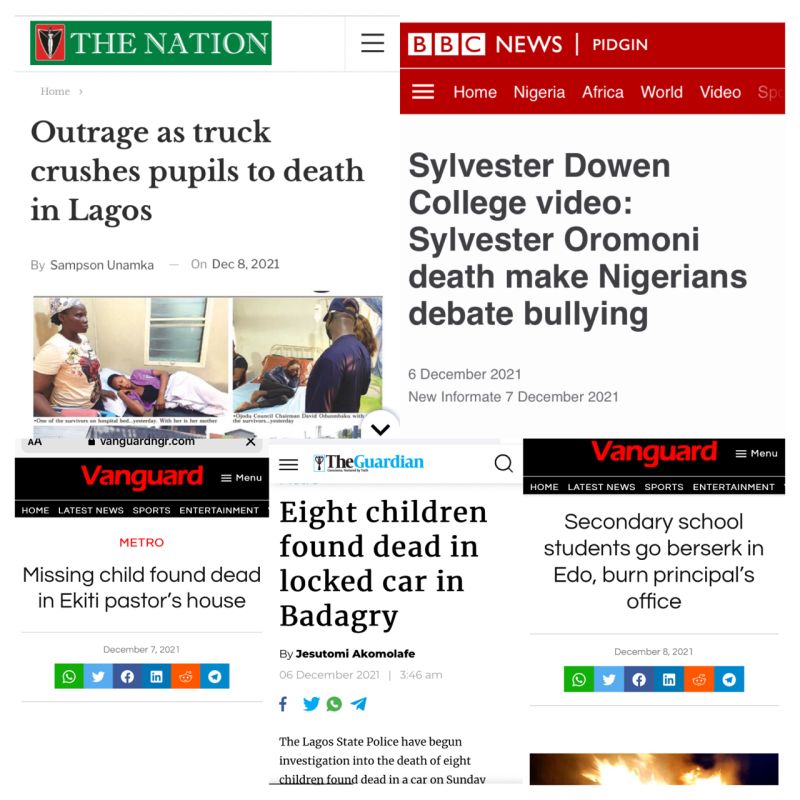- Have any questions?
- [email protected]
#AccountabilityWatch: What are the federal and state governments doing about the plight of children?

#TransparencyWatch: Nigeria’s subsidy removal quagmire and the imperative for sustainable policies
3 December 2021
Child Rights Act Monitor: See Updated List of States without Child Protection Laws in Nigeria
17 December 2021The last two weeks will most likely pass off as the most difficult for Nigeria’s young population in recent times.
In the period under review, there’s been the case of 12-year old Sylvester Oromoni, alleged to have died after he suffered injuries from bullying and being forced to drink a substance. There’s also been tragic reports about eight children found dead in an abandoned vehicle in the Badagry area of Lagos, as well as that of a truck running in to a band of students at Ojodu, Lagos.
Worse off, eye-witness accounts reveal that the truck driver ran into the band of students while trying to evade arrest by Vehicle Inspection Officers (VIO) giving him a chase with their vehicles within an environs housing a public secondary school.
There have also been similar tragedies involving children in other parts of the country in the last one week and beyond. A major point of reference being the case of a seven-year-old girl murdered while she was on errand for her parents in Ekiti. She was allegedly waylaid and murdered in cold blood by the daughter of a pastor said to be mentally deranged.
Although these reports have again brought the issue of ‘child safety and protection’ to the front burner, it largely reflects the reality of a country with 43.49 percent of its total population aged 0 to 14 years. In all of these developments, one common thread is the very worrisome trend of little or nothing concrete being done on the part of government to stem the negative tide.
This is despite the fact that there are a myriad of issues affecting the development of the Nigerian child including poor ante-natal and post-natal care, child wandering, child abandonment, child labour, rape cases, gender-based violence.
Equally sad, Nigeria has the highest number of child marriages in Africa and highest number of out-of-school children in sub-Saharan Africa respectively. It has a total of 23 million girls and women married in childhood and an estimated 10,193,918 out-of-school population.
The United Nations Convention on the Rights of the Child was in 1989, adopted by countries of the world, and a regional equivalent followed in 1990; in form of the African Charter on the Rights and Welfare of the Child. Since then, it has been a commonly held belief that the rights and fundamental freedoms of children are not debatable.
While Nigeria as a country and signatory to these covenants gave it legal consent by passing the Child Rights Act (CRA) in 2003; nine states in the country are yet to domesticate this all-important legislation.
Every democratic government at the national or sub-national level exist to protect the freedoms of its citizenry, which they must give account of, from time to time. Importantly, the protection of lives and properties (right to life) represent a cornerstone in this mandate and citizens cannot just rely on media promises in the quest for these anomaly to be done away with.
It’s also a no-brainer that the amount of attention given to the interest of children and their protection as a vulnerable population will go a long way in bringing negative developments in the society to a halt. Chief among these is their possible drift in the future into criminalities, especially if they become willing tools in the hands of mischief makers.
It is therefore imperative that the 36 state governments, as a matter of urgent national importance demonstrate willingness to accord its young citizens (residents) special attention and protection in order for them to pass through the various stages of survival and development successfully.
This most crucial and urgent step towards making this happen, has to be the commencing strict enforcement (or domestication where applicable) of relevant legislations like the Child Rights Act (CRA), the Violence Against Persons (Prohibition) Act and others critical for the protection of human dignity. The issue of criminal justice must not be taken lightly, if making culprits deterrent for others is considered as important in achieving this.
It is a fact that no state in today’s world ambitious of becoming a force to be reckoned with, would sit back and watch children go to waste on a daily basis in very avoidable circumstances. It shouldn’t even be Africa’s largest democracy currently struggling with herculean and hydra-headed security challenges.

